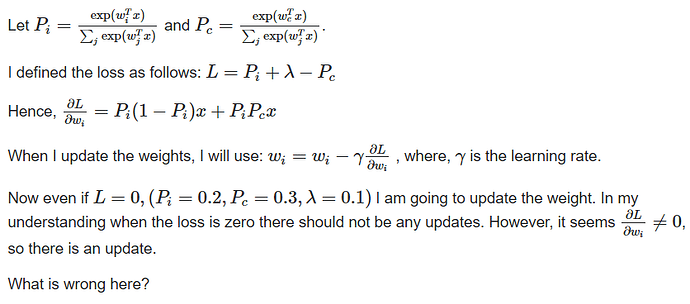Hello smani -
First, could you please post text rather than screenshots?
(It makes things searchable, lets screen readers work, etc.)
If you need to post an equation that you can’t format adequately
using the forum’s markdown, you could post a screenshot of
that, but do then refer to and describe the equation in your text.
I haven’t verified your analytic computation of the gradient;
I’ll take your word for it.
But I think the issue is the following:
You say “In my understanding when the loss is zero there should
not be any updates.” In general, this isn’t correct. It’s true that we
often work with loss functions that are non-negative (never less
than zero), and often “loss = 0” implies “true solution found.” But
the value of the loss function has no particular meaning in the
pytorch framework. It is just something you minimize to train
your network. Nothing prevents your loss function from having
a minimum of less than zero, and nothing prevents pytorch from
finding that minimum.
In gradient descent, the (negative of the) gradient tells you the
direction to move in parameter space to make your loss smaller.
(That is, algebraically smaller – less positive, which is the same
as more negative.)
Your example illustrates this general point. Your loss function
has the constant lambda in it. But the locations of any minima
of your loss function don’t depend on lambda, the gradient is
independent of lambda, and the optimization algorithm
(presumably gradient descent) doesn’t care about lambda.
If your loss function happens to be zero for some particular
value of lambda, training won’t stop, nor should it – the fact
that your loss was zero was merely an artifact of that particular
value of lambda.
Good luck.
K. Frank
